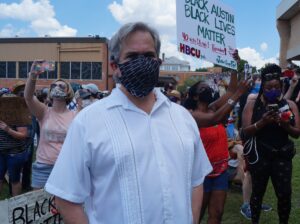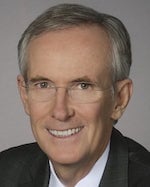“It was the best of times, it was the worst of times, it was the age of wisdom, it was the age of foolishness, it was the epoch of belief, it was the epoch of incredulity, it was the season of light, it was the season of darkness, it was the spring of hope, it was the winter of despair.”
–Charles Dickens, A Tale of Two Cities
Will the epoch of Mayor Steve Adler be remembered as an “age of foolishness” or a “spring of hope”?
The two-term mayor will step down January 6th after a nail-biter of an election to replace him between Celia Israel and Kirk Watson.
Watson, a former state senator and former mayor, defeated State Representative Celia Israel by fewer than 1,000 votes in a hard-fought, occasionally bitter election contest.
Both Israel and Watson represented experienced alternatives to the outgoing mayor, an eminent domain attorney who had never held elective office before his mayoral win in 2014.
Adler governed ambitiously but struck out often: his efforts to overhaul the land code ended in bitter political divisions and failure in the courts; his repeal of a public camping ordinance was overturned by voters; and his public safety policies generated blowback from the legislature.
His relationships with industry stakeholders led him down a variety of dead ends: he tried and failed to stop Uber and other ride-hailing companies from operating in the city; he unsuccessfully lobbied businesses to fund a massive tent shelter for the homeless; and he poured political capital into plans to expand the Convention Center, only to see them upended by a pandemic.
One of his successes was striking a deal to bring a pro soccer stadium to Austin. Though the terms were controversial—the team pays no rent for use of city land for its stadium—the decision was popular.
He also campaigned successfully for voter approval of key infrastructure projects, including bond funding for roads, bikeways, and trails, and a dedicated tax to build light rail and commuter bus lines.
Affordability and displacement
During his tenure, Austin became wealthier and less diverse, despite the state as a whole growing more diverse. The mayor and the council he led raised the effective tax rate every year that he was in office, raising the costs of property ownership.
Census results in 2020 showed that more Blacks and Hispanics moved outside the city to Pflugerville, Manor, Round Rock, and Buda. From 2010 to 2020, the White population grew at roughly double the rate of the Black population, which dropped as a share of the total from 7.7 percent to 6.9 percent, even as it increased nearly 50 percent in Pflugerville, doubled in Round Rock, and quadrupled in Buda.
Many working class Whites have also been squeezed out of the city, and newcomers are forced to endure longer commutes from booming exurbs like Leander, Kyle, and Bastrop. Labor shortages hit numerous industries within Austin, including for critical local government roles like bus drivers, 9-1-1 operators, and teachers.
Adler’s would-be successor Celia Israel hammered this theme in campaign speeches and media appearances, saying at a December 5th debate, for instance, “We’re losing our diversity. We’re losing our economic muscle.”
“It’s not sustainable to expect that line chef at the W (a luxury hotel/condo where Mayor Adler lived throughout his time in office) to make our fancy omelet and then go home at night to Bastrop.”
Pandemic response
During his second term, Adler confronted the Covid-19 pandemic.

Controversially, the mayor shut down public parks and playgrounds early in the pandemic, despite a lack of evidence that Covid-19 spreads outdoors. Yet two months later, Adler participated in a mass gathering outdoors protesting police brutality, and later in the year he hosted a wedding for his daughter in Mexico, even as his government publicly warned Austinites not to gather in groups larger than ten.
The incident earned him the nickname “Cabo Steve”—a reference to the resort of Cabo San Lucas, Mexico, where the wedding took place—and drew unflattering comparisons to Mayor Quimby of The Simpson’s, who appeared in a seemingly prescient 1993 episode making an “emergency announcement” while vacationing in the Bahamas.
Such missteps severely undermined Adler’s credibility on public health matters and fueled conspiratorial narratives that the pandemic was fake, or at the very least an exaggerated risk. “Adler squandered much of his remaining political capital on his trip to the beach,” Texas Monthly stated in an article derisively entitled “Cabo San Dufus.” Adler himself apologized and said he feared his actions would reduce public compliance with health guidelines.
Reimagining Public Safety
On public safety, Adler oversaw an overhaul of the police academy, cuts to the police budget, and significant new investments in emergency medical services and community health paramedics. The city halted police cadet classes for a year and a half and hired a New England professor who is leading an ongoing revision of the training.
The city’s public safety challenges grew during Adler’s time in office. Homicides, fentanyl overdoses, and traffic fatalities reached all-time highs during his second term.
‘A magnificent eight years’
One of Adler’s final acts as mayor was passing a tax deal benefitting the billionaire owners of a tract of downtown real estate. Adler defended the deal as a beneficial urbanizing measure while critics blasted it as a corporate giveaway and an environmental boondoggle.
Asked recently by a CBS reporter about his accomplishments, Adler said they included investing in mobility projects, advancing equity and social and racial justice, and managing the pandemic: “If the state had the same mortality rate that we had in the city of Austin, about 50,000 Texans would still be alive. So I’m really proud of what our city did.”
As to any failures, he expressed regret about how he had handled the revocation of public camping ordinances: “I wish we had done a little better job with managing shared public spaces when we decriminalized homelessness.”
Overall, Adler thinks his time in office was “a pretty magnificent eight years that I hope will hold the city in great stead over the next couple decades.”
Outside perspectives
Of course, Adler won’t have much say in how others remember him. Once the mayor has lost his bully pulpit, his ability to shape the narrative is pretty limited.
The Bulldog asked more than a dozen Austinites to offer their views on Adler’s legacy. We posed the question, “How do you think Steve Adler performed as mayor? What should he be remembered for, whether an accomplishment, a failure, a particular event, an incident, or a policy?” Five of them responded. Their answers have been lightly edited for length, clarity, and style.
We also welcome you to share your own thoughts on Adler’s legacy in the comment section below.

Daryl Slusher, editor of the Austin Independent and former Austin City Council member (1996-2005): “Steve Adler performed well at times. For instance, I think he was a good leader during COVID, with the exception of his secret trip to Cabo, which he apologized for when it was made public.
“I think, however, that Adler failed in an historic manner on one of his most fundamental responsibilities. Adler was the first mayor in the 10-1 District system. Thus he was the only elected official who represented the whole city. Especially as the first in this position, that gave him a responsibility to look after the interests of the entire city.
“He didn’t seem to think this was a responsibility and instead repeatedly pandered to narrow, often radical interests and blew in the wind. The result is a decimated police force, citizens being put on hold when they call 9-1-1, a less safe city, and a floundering city government.
“Another shortcoming was his dishonesty, and I do not say that lightly. Specifically on the Land Development Code he spent four years touting his ‘Austin Bargain,’ explaining for instance in his 2017 State of the City Address, ‘For starters, let’s agree we will not force density in the middle of neighborhoods. There’s no sense in shoving density where it would ruin the character of the city we’re trying to save in the first place…’
“Then, after getting reelected in 2018, Adler decided the council needed to do exactly what he had been claiming to oppose for four-plus years. He failed to seek any compromise between the two positions that he himself had held.
“The breadth of Adler’s failure might be best illustrated by the fact that the recent crop of candidates ran with pledges to solve the housing and affordability crises, the same crises he promised to fix when he first ran in 2014.”

Ora Houston, former District 1 City Council Member (2015-2019): “Steve Adler ‘performed’ as mayor, as an actor on stage. His words on stage portrayed a different character than in his heart or shown by his actions. During my four years working with him on council, I was surprised to learn that, despite his rhetoric, the mayor did not hold the core values I attempted to adhere to as a public servant: values of trust, honesty, accountability, respect, and willingness to listen to voices of all Austinites—especially those Austinites who are being harmed by Mayor Adler’s goal of growth to benefit the privileged and propertied, while burdening the less powerful. Burdens like maximum yearly property tax increases on residences and small businesses and soaring rents.
“He consistently acted to maximize profits for major developers and real estate investors.
“On policy, the mayor purposefully ran Austin counter to the city’s charter. The mayor’s desire for a ‘strong mayor’ form of government was always apparent in his bullying of city staff and his attempts to bully council members. The city charter holds:
- the mayor is one of 11 members of the City Council,
- City Council as a whole sets policy, and
- the city manager executes council’s policies by managing the city’s departments and employees.
“The mayor added additional staff, paid for with funds from his salary and ‘volunteers’ who served as shadow managers striving to manage the city manager’s department heads (e.g., transportation, development, budget, etc.).
“In terms of his accomplishments, the mayor protected Austin’s West Side and exploited Austin’s East Side. The mayor effectively reinstated Austin’s history of mistreatment of ethnic minorities by attempting to convert ‘East Austin’ (1928’s ‘Negro District’) into ‘East Downtown’—the mayor’s label for ‘East Austin.’ His policies ran roughshod over non-Anglo residents, legacy homeowners, small business owners, and neighborhoods.”

Matt Mackowiak, chair of the Travis County Republican Party: “Steve Adler ran for mayor eight years ago as a pro-business moderate. Sadly, he made a hard left turn halfway through and the consequences for taxpayers and families have been tragic. He will be widely remembered as the worst mayor in city history, leaving office at a time when our city is grappling with affordability, public safety, homelessness and transportation as urgent crises.
“Our next Mayor has pledged to clean up Adler’s mess and all Austinites should unify to improve standard of living for everyone.”
Katie Naranjo, chair of the Travis County Democratic Party. No response.

Mary Ingle, former president of the Austin Neighborhoods Council: “Initially, Mayor Adler was seemingly responsive to neighborhood concerns and met regularly with us. Later his focus changed to bringing more people to Austin.
“What we held dear as current residents was being systematically dismantled during the CodeNEXT process. Had the mayor turned against us? Transition zones appeared and chipped away at our inner neighborhood-cores. Word games were played. He said he wouldn’t put transition zones in the middle of our neighborhoods, but nonetheless, the mayor voted for transition-zones impacting the middle of most neighborhoods. This action conflicted with promises made to the public in a letter. Our public input was disregarded.
“Later issues such as affordable housing, traffic, police oversight/reform, the Precourt Stadium deal, homelessness, and transparency at council meetings all contributed to a legacy that could be described as transactional. Austin has become a playground for a wealthier population with luxury apartments while middle and low-income families of all colors have been displaced. It will take years to correct or undo the arrogance done to Austin’s lower and middle class population in these last eight years.”

Trust indicators: Bulldog reporter Daniel Van Oudenaren is a journalist with 13 years experience in local, state, and international reporting. He covers local elections and issues of government transparency and accountability.








WOW! Thanks for the reminders Austin Bulldog. I had forgotten about the land giveaway to the wealthy Austin FC owner who formerly worked for Donald Trump’s lender, Deutche Bank.
After reading the comments from the Honorable Ora Houston I recall why I am so looking forward to never seeing him on the dais again.
I have PTSD from just a couple meetings with Adler on behalf of my neighborhood plan contact team.
My first experience with Mayor Adler was during his second run for mayor. An elderly neighbor WWII veteran wrote an appeal to Mayor Adler seeking the mayor’s help to stop overflow parking from AirBnb’s around his house. The visitor’s cars block the elderly neighbor’s view to exit his driveway safely.
I agreed to take my neighbor’s letter to Mayor Adler who was participating in a mayoral debate at my neighborhood association. I delivered it to him following the debate and he handed it off to his aide, Jon Micheal Cortez, who said they would be getting in touch with my neighbor to see how they could assist him.
After we were cleaning up from the debate, someone found the letter to the Mayor on the ground and brought it to me. Needless to say neither the neighbor nor myself heard from the Mayor.
The Mayor made a promise in a church basement to help an elder who had served his country in the Pacific theatre of WWII. He did not keep that promise.
As former CM Slusher pointed out, the Mayor had the opportunity to be the Mayor for all of Austin and instead he was the Mayor who travelled to China and S. Korea on development trips and courted foreign sovereign wealth funds interested in Austin as an investment.
I will stop now as this is not helpful to my own hopes for Austin’s future. Thank you Austin Bulldog for being a sentinel of democracy.
I’m an Austin native, second generation local small business owner, and so interested to see that these comments support my feelings about Adler. He seemed to measure his words when he spoke, and his actions reflected that of a developer. My Neighborhood’s Plan was disregarded in a zoning case which surprised me because I thought Neighborhood Plans were legal documents.
In a side note, during the last 5 years, 4 of my childhood friends have left Austin . They moved to CO (2), NM, and NC. They were done with Austin .
I’m hopeful that some of the charm can still be saved, but I’m skeptical. I may be too old for this city that loves scooters , ADUs, and doesn’t respond to 911 and 311 calls. Bd
I want to thank Daniel Van Oudenaren and the four critics of former Mayor Adler’s administration for their thoughtful remarks. The contrast between former Mayor Adler’s self assessment and their seasoned but sharp criticisms could not paint a clearer picture of the complete disconnect that can occur between an elected offical and the citizens that official was elected to govern. This article provides a sober foundation for Adler’s successors to begin to repair the damage he has done to good governance in Austin – which should always be the practice of respect and the reasonable balance of competing interests. Albert Meisenbach
I want to thank Daniel Van Oudenaren and the four critics of former Mayor Adler’s administration for their thoughtful remarks. The contrast between former Mayor Adler’s self assessment and their seasoned but sharp criticsims could not paint a clearer picture of the complete disconnect that can occur between an elected offical and the citizens that official was elected to govern. This article provides a sober foundation for Adler’s successors to begin to repair the damage he has done to good governance in Austin – which should always be the practice of respect and the reasonable balance of competing interests. Albert Meisenbach
Nearly all of the negative results this nasty hit piece attributes to Mayor Adler happened in most big cities in the United States.
I did not vote for Steve Adler when he ran for mayor and I have spent eight years feeling acute embarrassment at having been so wrong. He has been an outstanding Mayor and I shall nurture the hope of getting another chance to vote for him for another public office before I step on my rainbow.